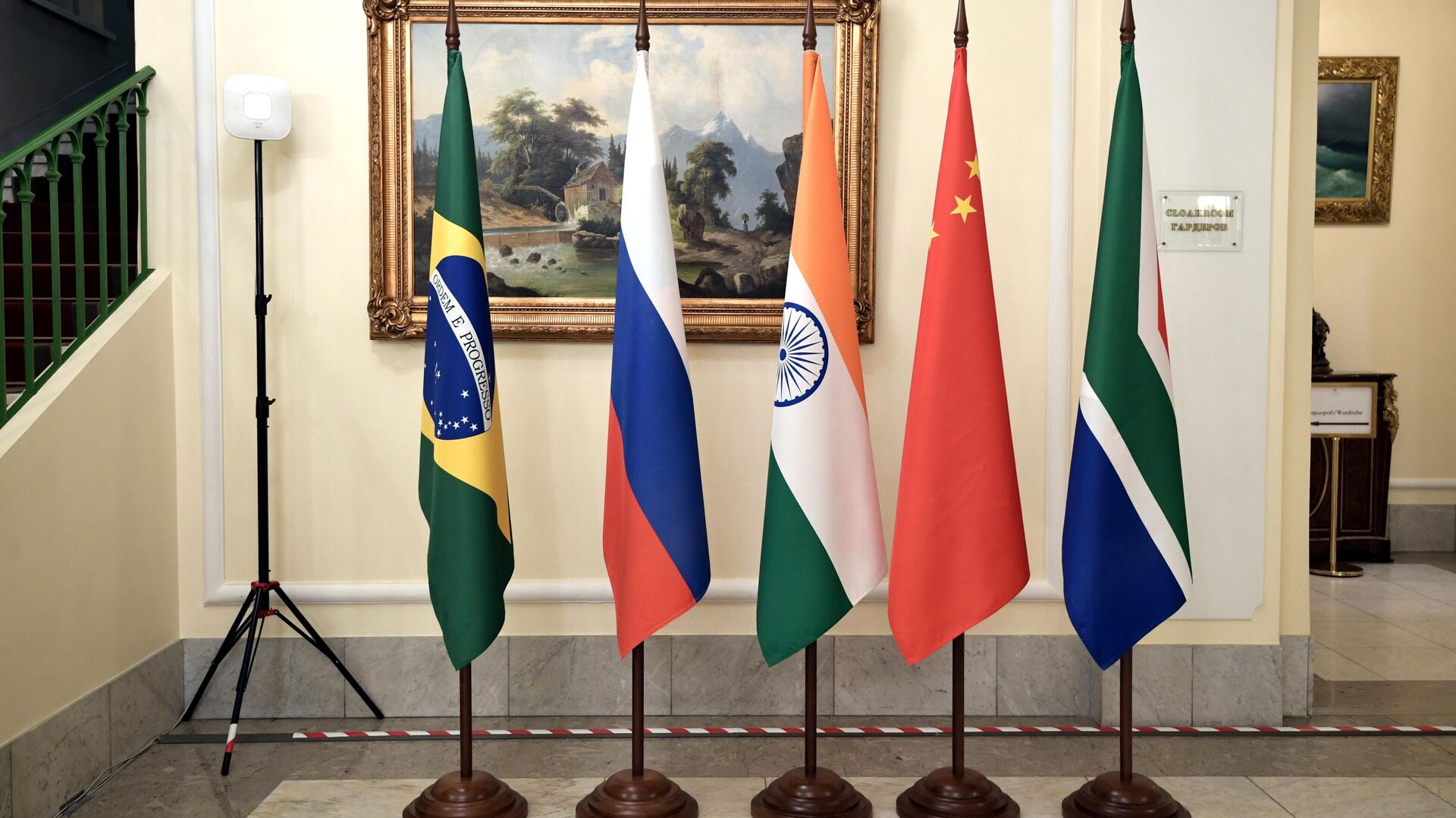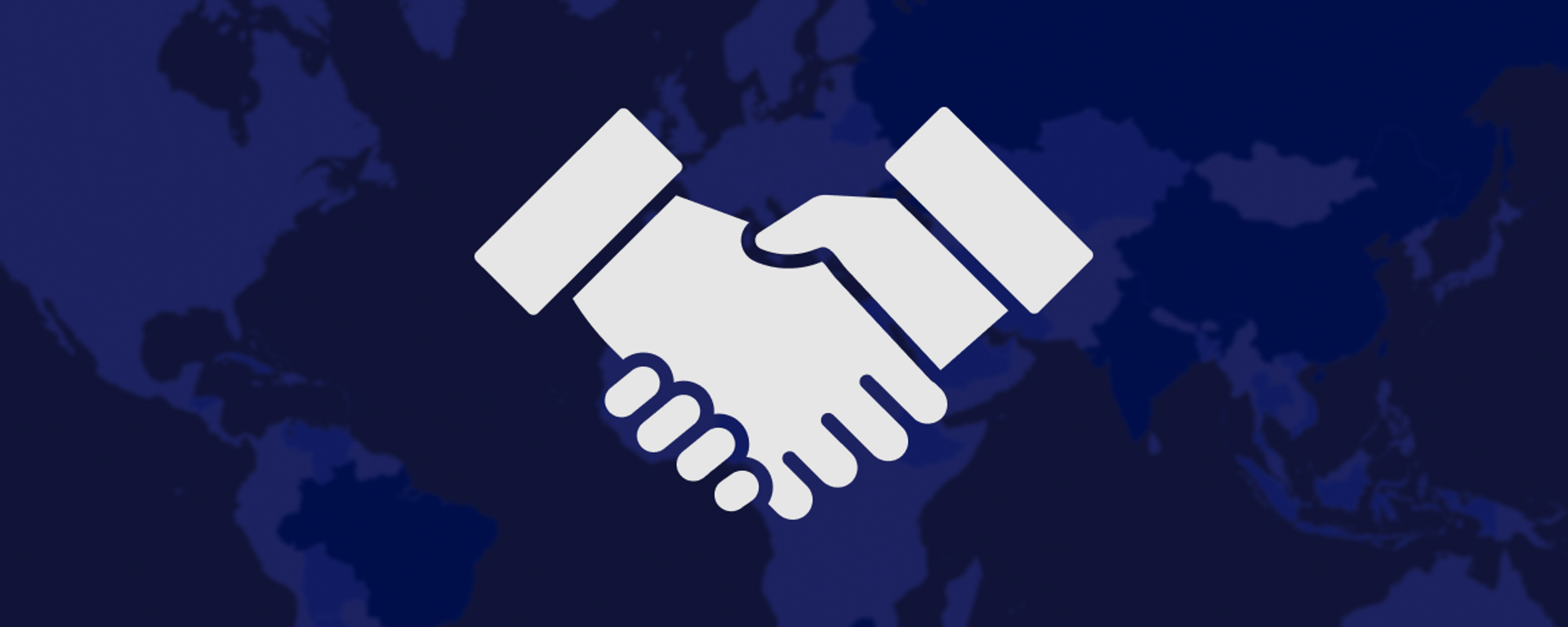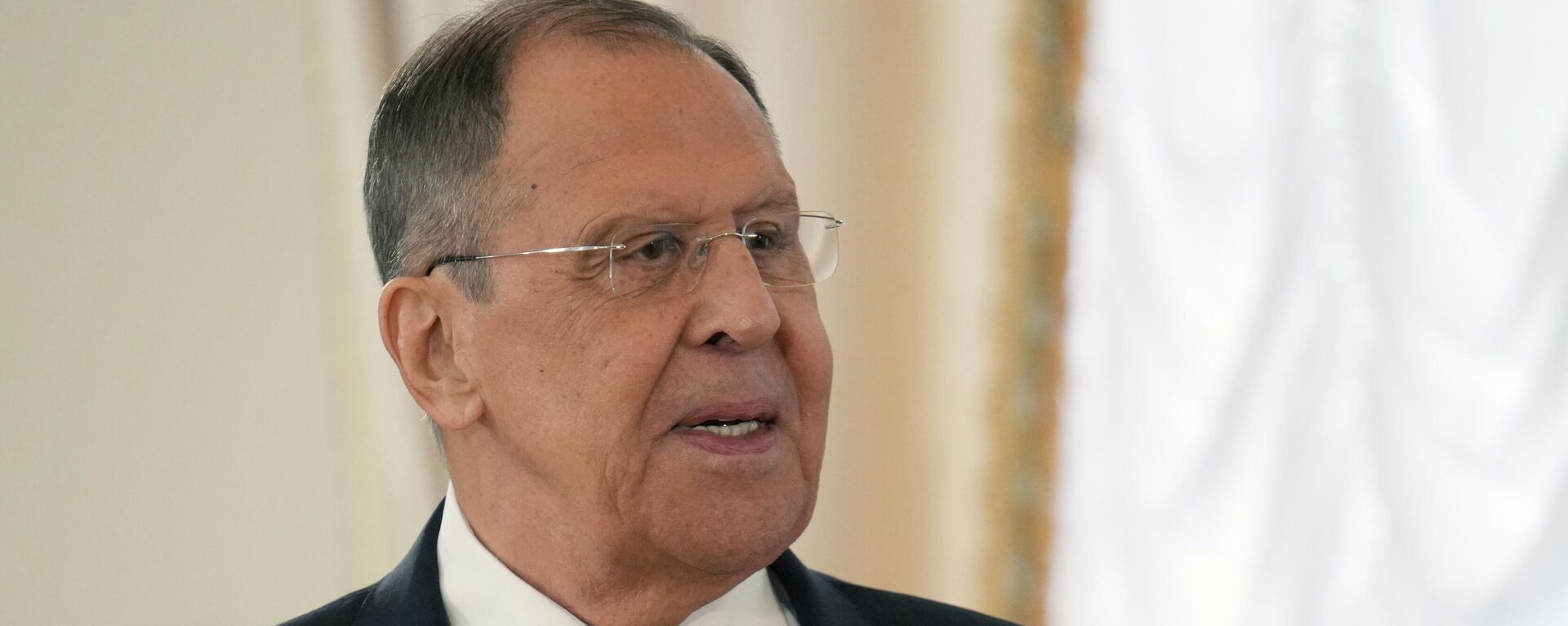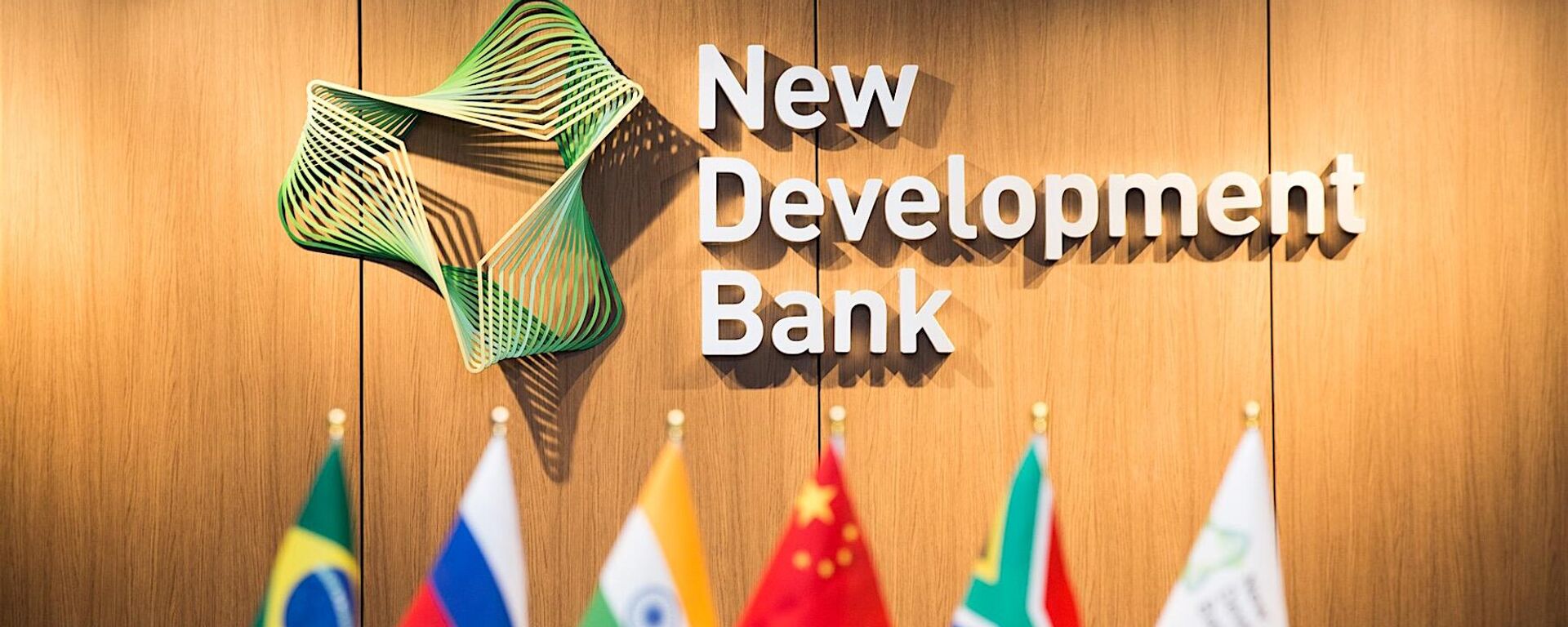https://en.sputniknews.africa/20230821/democratization-of-multipolar-world-order-lures-brics-hopefuls-expert-emphasizes-1061467831.html
Democratization of Multipolar World Order Lures BRICS Hopefuls, Expert Emphasizes
Democratization of Multipolar World Order Lures BRICS Hopefuls, Expert Emphasizes
Sputnik Africa
The 15th BRICS Summit, set to be hosted in South Africa on August 22-24, is anticipating an extensive enlargement as admission is being sought by many... 21.08.2023, Sputnik Africa
2023-08-21T14:38+0200
2023-08-21T14:38+0200
2023-08-21T14:38+0200
brics
2023 brics summit in johannesburg
brics summit
brics expansion
interview
economy
politics
multipolarity
new development bank (ndb)
alternative currency
https://cdn1.img.sputniknews.africa/img/07e7/06/1c/1060218828_0:144:3131:1905_1920x0_80_0_0_5d7e81b5035a4f44e5ddae085f032593.jpg
The organization that unites the world's five leading developing economies, collectively known as BRICS (Brazil, Russia, India, China, South Africa), is promoting a more just global order, which explains the ever-increasing attention the bloc is attracting, a researcher at the Institute for Global Dialogue Mikatekiso Kubayi told Sputnik Africa.Concert of DiversityAccording to the researcher, the club's possible enlargement is still an open question, yet, a rather intriguing one.He also emphasized the importance of the upcoming BRICS summit due to the potential expansion of the bloc, which is likely to enhance the organization's already "quite significant" weight in terms of market share and the planet's population that it accounts for.In addition, a larger and more diverse number of members will probably allow the bloc to have a "potential influence" on various political issues, according to the expert.Kubayi also stressed that the diversity of the potential members of the organization will contribute to a more equal dialogue between them, which also makes the group attractive.A total of 23 countries have submitted their applications to join the organization, South African Foreign Minister Naledi Pandor revealed earlier in August. Such African countries as Algeria, Egypt, Ethiopia, Senegal and Nigeria applied for the membership. Iran, Turkey, Indonesia are also among the candidates.Elaborating on the particular interest of the African states in joining BRICS, Kubayi underlined that the bloc offers opportunities to build value chains within the continent, which are especially important in case of global crisis, he added, citing the COVID-19 pandemic as an example. Developing his idea about the attractiveness of BRICS for the continent, the expert emphasized the organization's pursuit to build interaction differently from the one in the existing global system with "the domination" of several actors. Among other the potential benefits of cooperation within the organization for the applicants, Kubayi pointed to "greater influence," a "great opportunity to be had at the political level," and "greater collaboration," which means an ability "to move an agenda quicker" and opportunities for "considerable" volumes of trade as well.However, with the possible extension, the club may encounter organizational management difficulties, the expert thinks.Speaking further about the complications that the bloc might face in the event new members are accepted, the expert noted that political, socio-economic and other differences among the participants could lead to certain "challenges" in cooperation, stressing, nevertheless, that the benefits are rather "significant" in any case.BRICS Bank Highlighted As 'Phenomenal instrument'Another topic that adds to the importance of the current BRICS Summit, according to the expert, is the issue of the global financial architecture and the discussion that is surrounding it. He emphasized that BRICS efforts on the matter aim to reinforce economic integration among developing nations rather than to remove the US dollar from the international financial operations.Regarding BRICS' endeavors in the financial sphere, the bloc is interested in increasing the use of national currencies in the trade, Dilma Rousseff, the president of the BRICS New Development Bank (NDB) announced during the Second Russia–Africa Summit, which took place in the Russian city of St. Petersburg on July 27-28. She added that members of the BRICS group do not cooperate against third parties, even in financial matters.According to the expert, the NDB, created in 2014, originally aimed to build "a fairer, more equitable global governance system of the global economy" and over almost 10 years the world can see the realization of its aspirations as the bank began financing projects and issuing bonds in member local currencies.Commenting on the significance of the BRICS bank and its role in financing projects in Africa, the researcher highlighted that accepting new members into the organization would expand the bank's resources.Speaking about the key differences of the NDB, Kubayi noted the main advantage in his opinion is the turnaround time between the application for financing and the actual outcomes of the approval process for financing, which is about "3 months."Kubayi added that, although, the bank's potential for global influence is "huge", there is still room for it to grow, as "it hasn't reached exactly where it wants to be."Estimating how much time it could take before NDB may compete with Western institutions, the researcher supposed that it depended on several factors, however, he believes that the bank will become a "much more formidable institution." Shift in Global Balance of PowerAs for the impact of the BRICS group in geopolitics, taking into account the possible expansion of the organization, the expert noted that the bloc could have the capacity to materialize the great shift in the global balance of power.However, while recognizing that there are those that believe "a new order has already taken full", Kubayi himself is not sure whether the shift has already happened, adding that, nevertheless, "we can see that there's definitely a great shift in the global balance of power, and that shift will only be become more expressed, more pronounced."He went on to speculate about uniting developing countries from around the world under a single agenda with a common goal, which he said was "already a big deal" which allowed observers to sense tectonic shifts in the international relations system.Kubayi emphasized that BRICS, as an association of different countries from around the world, with economic heavyweights can team up with other nations.
https://en.sputniknews.africa/20230811/which-nations-have-officially-applied-to-join-brics-family-1061261192.html
https://en.sputniknews.africa/20230821/brics-launched-expansion-process-to-build-a-just-world-lavrov-says-1061483744.html
https://en.sputniknews.africa/20230814/de-dollarization-brics-urges-its-bank-to-expand-lending-in-national-currencies-1061318646.html
Sputnik Africa
feedback@sputniknews.com
+74956456601
MIA „Rossiya Segodnya“
2023
Rasina Musallimova
https://cdn1.img.sputniknews.africa/img/07e7/0a/17/1063019139_0:0:646:646_100x100_80_0_0_348c74b69cf86748a53875f8148a2f85.jpg
Rasina Musallimova
https://cdn1.img.sputniknews.africa/img/07e7/0a/17/1063019139_0:0:646:646_100x100_80_0_0_348c74b69cf86748a53875f8148a2f85.jpg
News
en_EN
Sputnik Africa
feedback@sputniknews.com
+74956456601
MIA „Rossiya Segodnya“
Sputnik Africa
feedback@sputniknews.com
+74956456601
MIA „Rossiya Segodnya“
Rasina Musallimova
https://cdn1.img.sputniknews.africa/img/07e7/0a/17/1063019139_0:0:646:646_100x100_80_0_0_348c74b69cf86748a53875f8148a2f85.jpg
brics, brics summit, brics expansion, interview, economy, politics, multipolarity, new development bank (ndb), alternative currency, us dollar, de-dollarization, covid-19
brics, brics summit, brics expansion, interview, economy, politics, multipolarity, new development bank (ndb), alternative currency, us dollar, de-dollarization, covid-19
Democratization of Multipolar World Order Lures BRICS Hopefuls, Expert Emphasizes
Longread
The 15th BRICS Summit, set to be hosted in South Africa on August 22-24, is anticipating an extensive enlargement as admission is being sought by many non-members from the Global South, along with some international organizations. Worldwide interest in the club is on the rise as its member states promote a "more just," multipolar world.
The organization that unites the world's five leading developing economies, collectively known as BRICS (Brazil, Russia, India, China, South Africa), is promoting a more just global order, which explains the ever-increasing attention the bloc is attracting, a researcher at the Institute for Global Dialogue Mikatekiso Kubayi told Sputnik Africa.
"The attraction of BRICS is another very complicated matter. I mean, imagine it being in a forum that firstly works on consensus. Secondly, it promotes collaboration, cooperation and peace, and promotes fairness in global governance, promotes equity, [and] in fact, the democratization of the multilateral system. You're essentially looking at something organic, and it's very, very organic," he said, sharing his expectations of the upcoming summit.
According to the researcher, the club's possible enlargement is still an open question, yet, a rather intriguing one.
"It's actually a very important one because many people, the world over there, are going to quite simply looking forward to what pans out next week. And you will recall that there were some many things, many areas of discussion that need resolution.[...] There will be an announcement of an admission this year, when or if there's an admission. Would it be just a few, or will it be three? Will it be all 23? Will it be half of that, or will it be deferred to the following BRICS summit in Russia next year? So that's a very, very big one," the expert told Sputnik Africa.
He also emphasized the importance of the upcoming BRICS summit due to the potential expansion of the bloc, which is likely to enhance the organization's already "quite significant" weight in terms of market share and the planet's population that it accounts for.
"It's big because imagine if what you already have is a BRICS bloc that is quite significant in terms of its share of the global economy. One, its share of the global population, its share as a market. Now, if you expand it even more, an even bigger population with an even bigger might could drive a bigger potential pool of resources, even more so for, the function of the new development bank and its objectives," Kubayi elaborated.
In addition, a larger and more diverse number of members will probably allow the bloc to have a "potential influence" on various political issues, according to the expert.
"But you also have a greater cooperation, potential cooperation and collaboration in the political spin political sphere right now. For instance, imagine you have Saudi Arabia and Iran, you have Argentina, you have Indonesia, you have Algeria, Egypt, [countries] from Africa, among others. You already have quite a formidable group for potential influence for a particular agenda or another. So that's a very big thing, and it's particularly important," the researcher highlighted.
Kubayi also stressed that the diversity of the potential members of the organization will contribute to a more equal dialogue between them, which also makes the group attractive.
"The bloc says let's do things differently. Everyone has got their own local material conditions, the conditions of each country differ quite significantly in many cases. So BRICS is able to say that everybody is welcome. Everybody has their own needs. And all of these needs will be accommodated and will promote discussion," the expert shared his opinion with the reporters.
A total of 23 countries have submitted their applications to join the organization, South African Foreign Minister Naledi Pandor
revealed earlier in August. Such African countries as Algeria, Egypt, Ethiopia, Senegal and Nigeria applied for the membership. Iran, Turkey, Indonesia are also among the candidates.
Elaborating on the particular interest of the African states in joining BRICS, Kubayi underlined that the bloc offers opportunities to build value chains within the continent, which are especially important in case of global crisis, he added, citing the COVID-19 pandemic as an example.
"Africa wants to develop regional value chains. There are no strong regional value chains that can buffer against potential global shocks in the supply chain, such as [Africa] experienced during the COVID-19 pandemic. It had money to buy equipment and money to buy vaccines, but none were available. [...] It really was quite unfortunate and there's a massive opportunity for everybody within and around the bloc to create those connectivities [sic] to enable investment in these global value chains," the researcher elaborated.
Developing his idea about the attractiveness of BRICS for the continent, the expert emphasized the organization's pursuit to build interaction differently from the one in the existing global system with "the domination" of several actors.
"When these regional value chains endure, what value chains that can potentially withstand such global shocks, particularly for those countries that would be in a desperate situation should the next pandemic hit. So that's what the attraction is, is immense. It's really, really big. I mean, considering just this shift alone, from the current system where you have essentially the domination by not just one or two or three of you, if you have a few countries literally, telling everybody how to do things, what to do when you do or who to be friends with the attraction is, is that great. Precisely because the bloc says, let's do things differently. Everyone has got their own local material conditions, even with that," he underlined.
Among other the potential benefits of cooperation within the organization for the applicants, Kubayi pointed to "greater influence," a "great opportunity to be had at the political level," and "greater collaboration," which means an ability "to move an agenda quicker" and opportunities for "considerable" volumes of trade as well.
However, with the possible extension, the club may encounter organizational management difficulties, the expert thinks.
"There are also challenges, potential challenge, because the bigger the number, the more complex the management of the dynamics within the bloc," he asserted.
Speaking further about the complications that the bloc might face in the event new members are accepted, the expert noted that political, socio-economic and other differences among the participants could lead to certain "challenges" in cooperation, stressing, nevertheless, that the benefits are rather "significant" in any case.
"Particularly given that, this is a bloc that works on consensus, how easy will it be to maintain that when you have so many members that all of them may have some different and varied interests? And different needs, different geographic realities, social realities, political realities and so on. [...] So you do have both challenges in terms of the internal workings of the BRICS itself, inter-BRICS cooperation and collaboration and the internal protocols. But the potential spinoffs, however, economic benefits, would be quite, quite significant, I think," he said.
BRICS Bank Highlighted As 'Phenomenal instrument'
Another topic that adds to the importance of the current BRICS Summit, according to the expert, is the issue of the global financial architecture and the discussion that is surrounding it. He emphasized that BRICS efforts on the matter aim to reinforce economic integration among developing nations rather than to remove the US dollar from the international financial operations.
The second issue that makes this year's summit popular is the the debate and discourse around the financial matters. [...] I would argue that BRICS’ efforts are not about dedollarization, but about rather integration, economic integration, information integration, equity, fairness in global financial governance and all of that. So it's not about the dollar, it's about the world integrating and working together seamlessly in better ways, finding more solutions, better solutions to challenges facing the globe, particularly developing countries," Kubayi noted.
Regarding BRICS' endeavors in the financial sphere, the bloc is interested in
increasing the use of national currencies in the trade, Dilma Rousseff, the president of the BRICS New Development Bank (NDB) announced during the
Second Russia–Africa Summit, which took place in the Russian city of St. Petersburg on July 27-28. She added that members of the BRICS group
do not cooperate against third parties, even in financial matters.
According to the expert, the NDB, created in 2014, originally aimed to build "a fairer, more equitable global governance system of the global economy" and over almost 10 years the world can see the realization of its aspirations as the bank began financing projects and issuing bonds in member local currencies.
Commenting on the significance of the BRICS bank and its role in financing projects in Africa, the researcher highlighted that accepting new members into the organization would expand the bank's resources.
"The second element is that you have a BRICS bank now that with additional members, it's got Egypt, Uruguay, the UAE, there's Bangladesh, and there are more that would potentially be joining that bank as well. So there's a lot of potential for additional resources to be put into the bank, and by the bank for the full financing when they're on the continent," he said.
Speaking about the key differences of the NDB, Kubayi noted the main advantage in his opinion is the turnaround time between the application for financing and the actual outcomes of the approval process for financing, which is about "3 months."
"What key difference between the NDB and many others? One: The turnaround time is between the application for financing and the actual outcomes of the approval process for financing, about three months or so. So an application can go in this month and money can be financed, can be disbursed three months later. Whereas others can take maybe 6 months to a year, others maybe even two years. So, and the conditionalities are also a lot better, a lot simpler, a lot easier. [...] So the NDB is a phenomenal instrument of the BRICS bloc because of the realization of its reform and development agenda," the expert elaborated.
Kubayi added that, although, the bank's potential for global influence is "huge", there is still room for it to grow, as "it hasn't reached exactly where it wants to be."
Estimating how much time it could take before NDB may compete with Western institutions, the researcher supposed that it depended on several factors, however, he believes that the bank will become a "much more formidable institution."
"When is it? Could be a while. Yeah, it could be sooner. It depends on how, for instance, the expansion of BRICS plays out, how quickly it's able to mobilize additional resources, how it's able to mobilize additional capital from […] possibly new members joining the bank. It depends. I mean, my bet is… don't know would be that in five years, the NDB would be a much more formidable institution than it currently is now," the expert shared his assumptions.
Shift in Global Balance of Power
As for the impact of the BRICS group in geopolitics, taking into account the possible expansion of the organization, the expert noted that the bloc could have the capacity to materialize the great shift in the global balance of power.
However, while recognizing that there are those that believe "a new order has already taken full", Kubayi himself is not sure whether the shift has already happened, adding that, nevertheless, "we can see that there's definitely a great shift in the global balance of power, and that shift will only be become more expressed, more pronounced."
He went on to speculate about uniting developing countries from around the world under a single agenda with a common goal, which he said was "already a big deal" which allowed observers to sense tectonic shifts in the international relations system.
"You're talking about countries from various regions. You've got now Asia, countries from Asia, Eurasia, Africa, South America. These are different continents coming together to say that, look, this is a common agenda that we carry and this is how we would like to take care of them and promote them and so on. That's already a big deal. [...] And so the potential for the realization of the expression of this great shift is very much palpable. It's very much there. It's very tangible. And I think it would be seen and felt a bit more after this summit," the researcher explained.
Kubayi emphasized that BRICS, as an association of different countries from around the world, with economic heavyweights can team up with other nations.
"And what countries agree to is what BRICS would therefore want to do, as opposed to: 'I have a very big economy. You have a small economy. Therefore, my voice will matter more than yours.' BRICS doesn't do that. China has a very large economy. I imagine the difference between China and South Africa. [...] But yet, South Africa has just as good a voice in the bloc as China. So these are some of the attractions that make BRICS so popular," he concluded.






